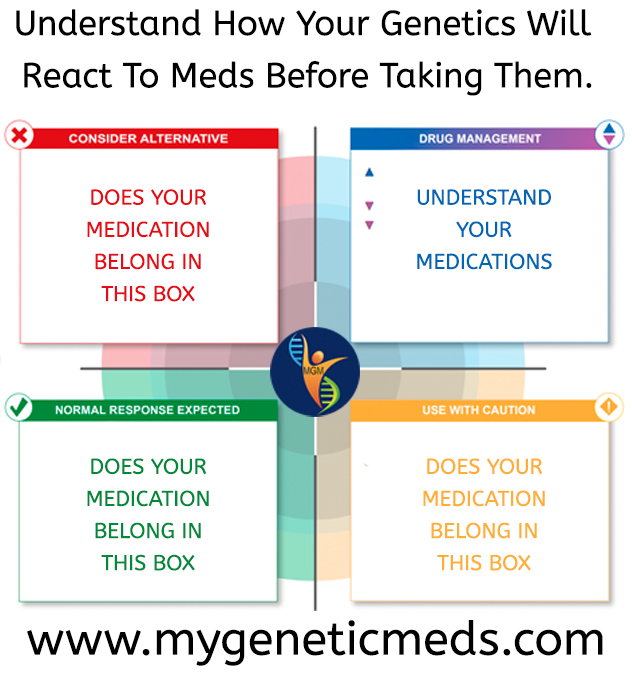Whats in the PGx Test Results
What's in the PGx test results and why do you want it? 1. Current Medications and Medications of Interest Clinical interpretation for patient's current medications provided by physician. This section includes pharmacogenomics and drug interactions (drug-drug, drug-food, drug-alcohol, drug-lab). 2. Comprehensive Drug List Includes gene-drug interactions for a 62 gene panel and approximately 100 medications aligned with the latest FDA pharmacogenetic recommendations and over 150 more arranged by therapeutic area, drug class, and mechanism of action. This section is designed to help optimize treatment options and manage patients with multiple conditions, effectively and efficiently. 3. Genotype and Phenotype Results This section will have the patient specific gene, genotype, and phenotype information of all 62 genes analyzed in the panel. Gene-Drug Interaction Types: Consider Alternative: Refers to gene-drug pairs in which the interaction between a drug and one or several genes may result in a clinically severe and potentially deadly adverse drug reaction(s) and lack of efficacy. Most medications included in this gene—drug pair category still can be used. However, please exercise extreme caution and clinical judgment, read the corresponding gene-drug interaction for your patient, and follow FDA recommendations. Use With Caution: Refers to gene-drug pairs in which the interaction between a drug and one or several genes may result in a mild adverse drug reaction(s) and lack of efficacy. Most medications included in this gene-drug pair category still can be used. However, please exercise caution and clinical judgment, read the corresponding gene-drug interaction for your patient, and follow FDA recommendations. Drug Management: Refers to gene-drug pairs in which a negative drug response (adverse drug reaction(s) and lack of efficacy) might be preventable by adjusting the medication to the patient's individual needs based on pharmacogenomic results and any other non-genetic factors of your knowledge. Please exercise caution and clinical judgment, read the corresponding gene-drug interaction for your patient, and follow FDA recommendations. Normal Response Expected: Refers to gene-drug pairs in which the corresponding drug response (adverse drug reaction(s) risk and efficacy) shall correlate with the FDA label description and is like that of the general population. Keep in mind that all drugs come with associated risks and should be taken into consideration when prescribing any medication. Please exercise caution and clinical judgment, read the corresponding gene-drug interaction for your patient, and follow FDA recommendations. Functional Phenotype: refers to the proteins function level coded by its gene linked to the individual's particular genotype. The functional phenotype nomenclature is directly related to the type of function carried out by the protein following standard cell biology nomenclature. Patient Impact: Refers to the drug specific type of clinical outcome as a result of the interaction between a medication and the protein(s) with which it interacts based on the patient's individual genotype. Pharmacogenomics (PGx) results DO NOT REPRESENT MEDICAL ADVICE and they SHOULD NOT replace standard protocol—based pharmacological care. PGx testing provides additional information regarding drug response based on the patient's genetic make-up associated with pharmacokinetics, pharmacodynamics, and other biological processes with the intent to provide insights regarding medications efficacy and adverse drug reactions. ONLY a patient's healthcare provider can make decisions regarding medication selections, medication dosage, medication additions, medication replacements, and stopping medications. Note to Patient: While these are your results, YOU should not make any changes to your medications, unless directly instructed by your healthcare provider. This is educational information and not meant to entice or persuade a person to follow through with genetic testing. Edited by Ken Taylor, Owner of My Genetic Meds
